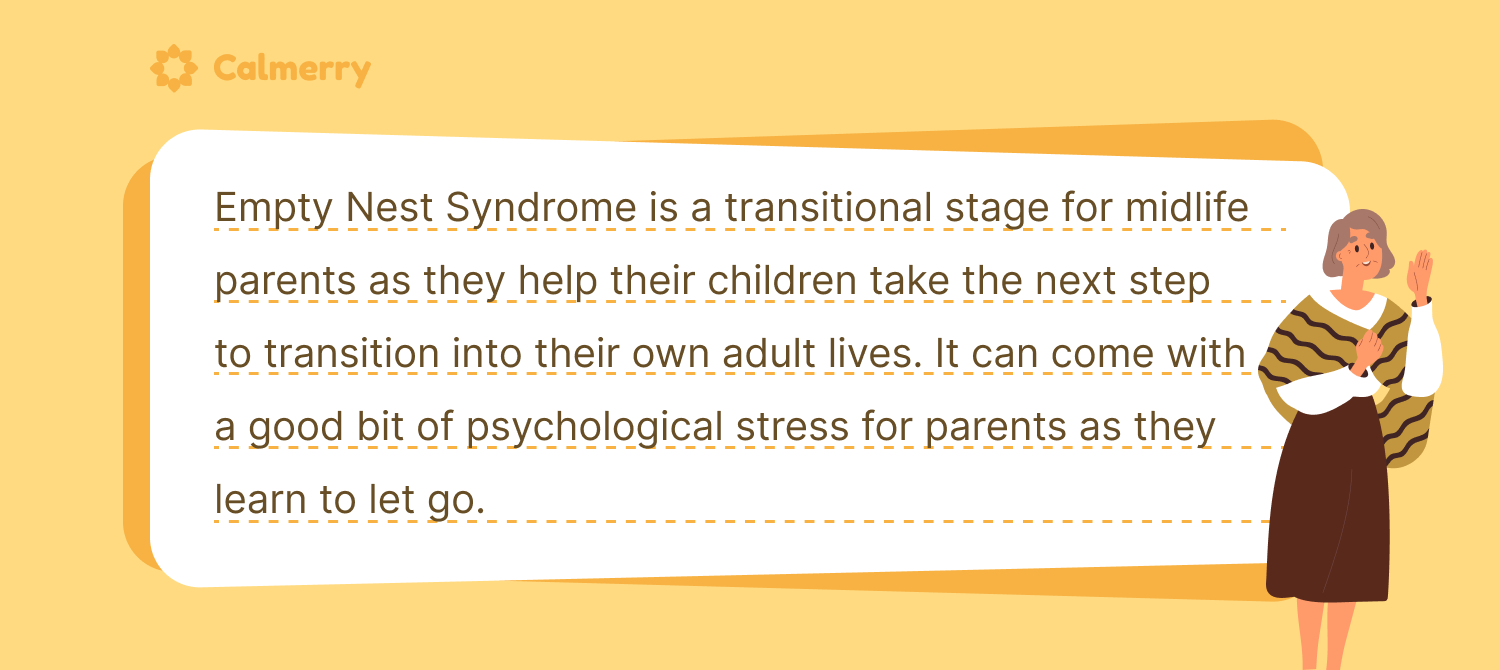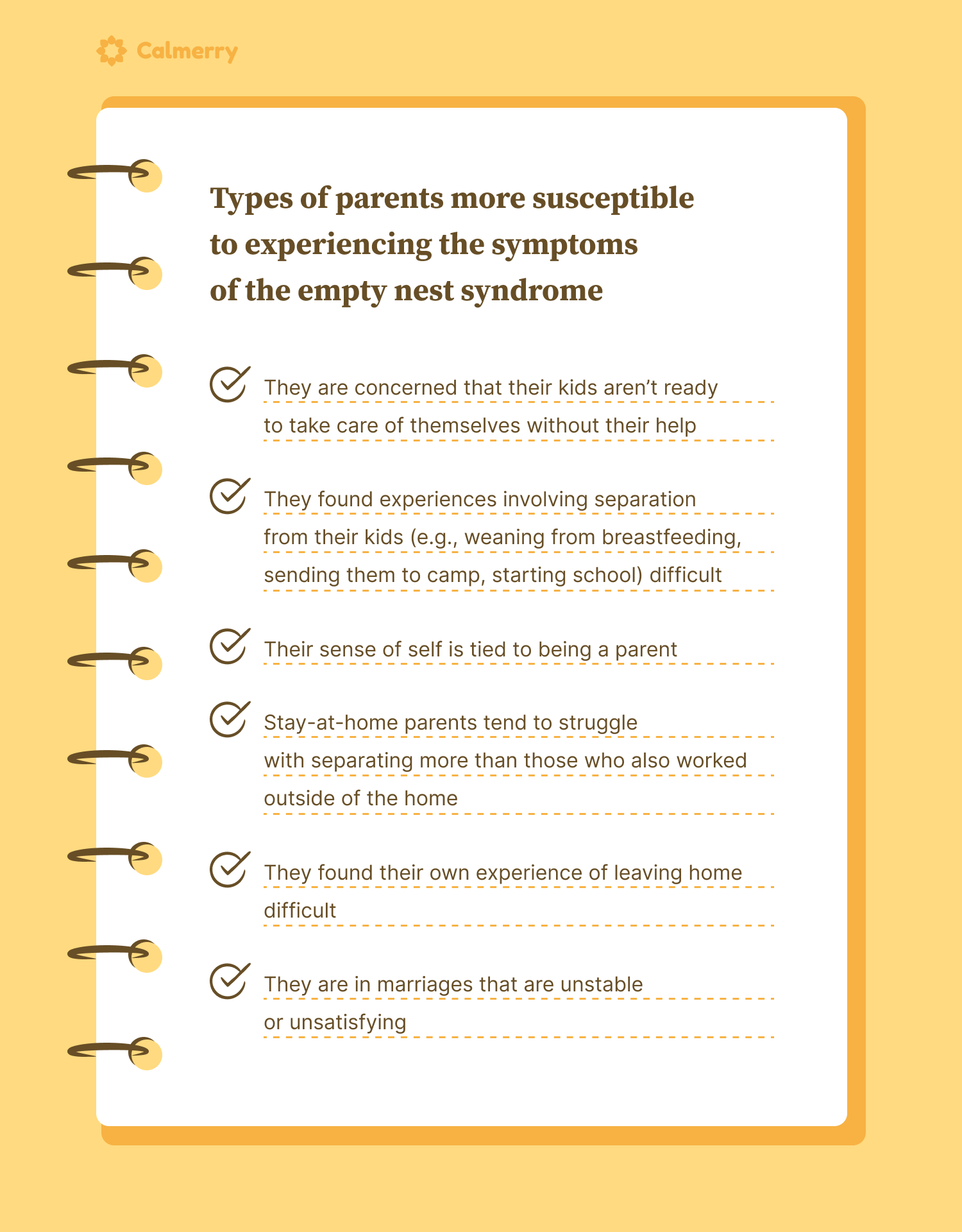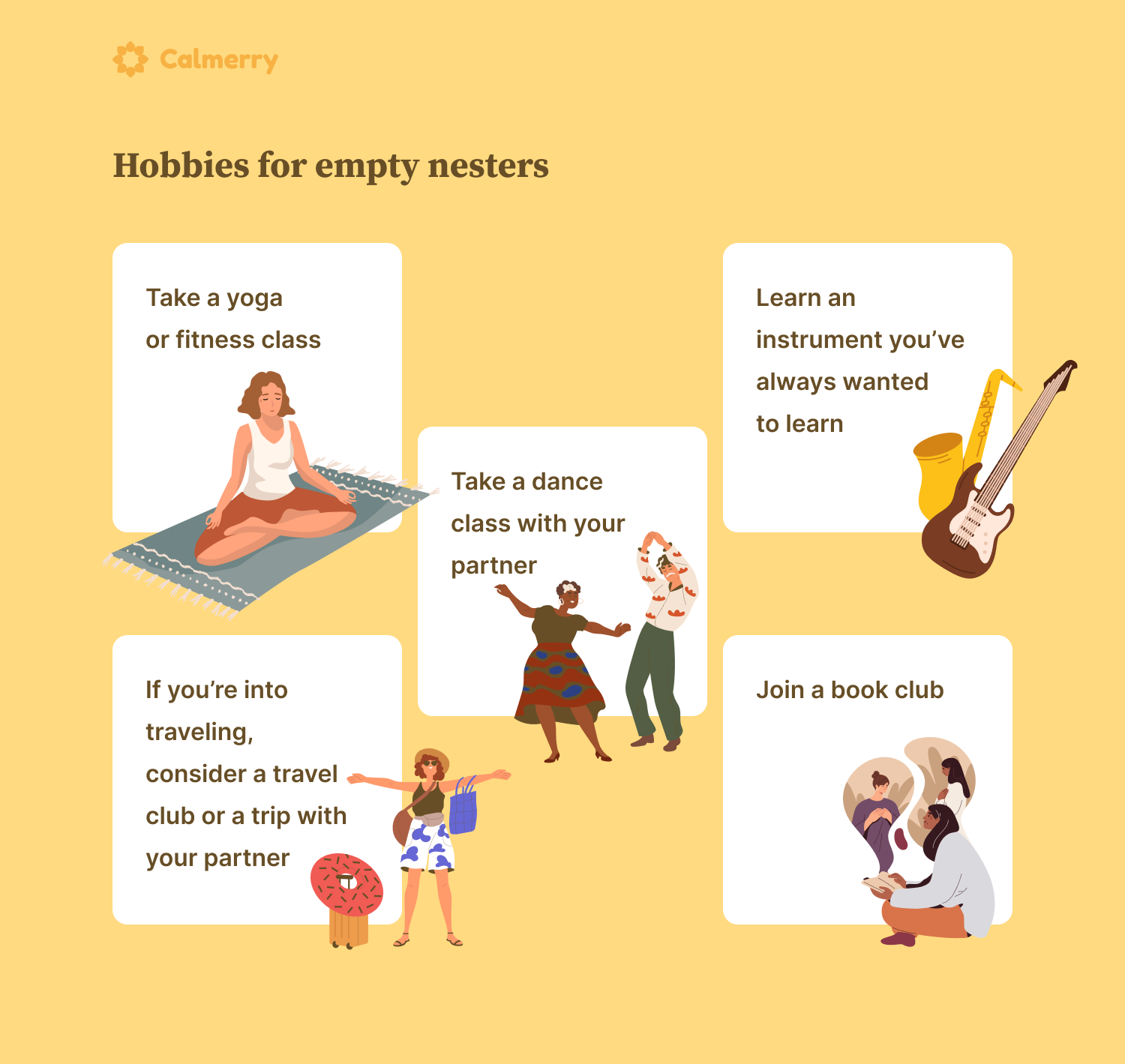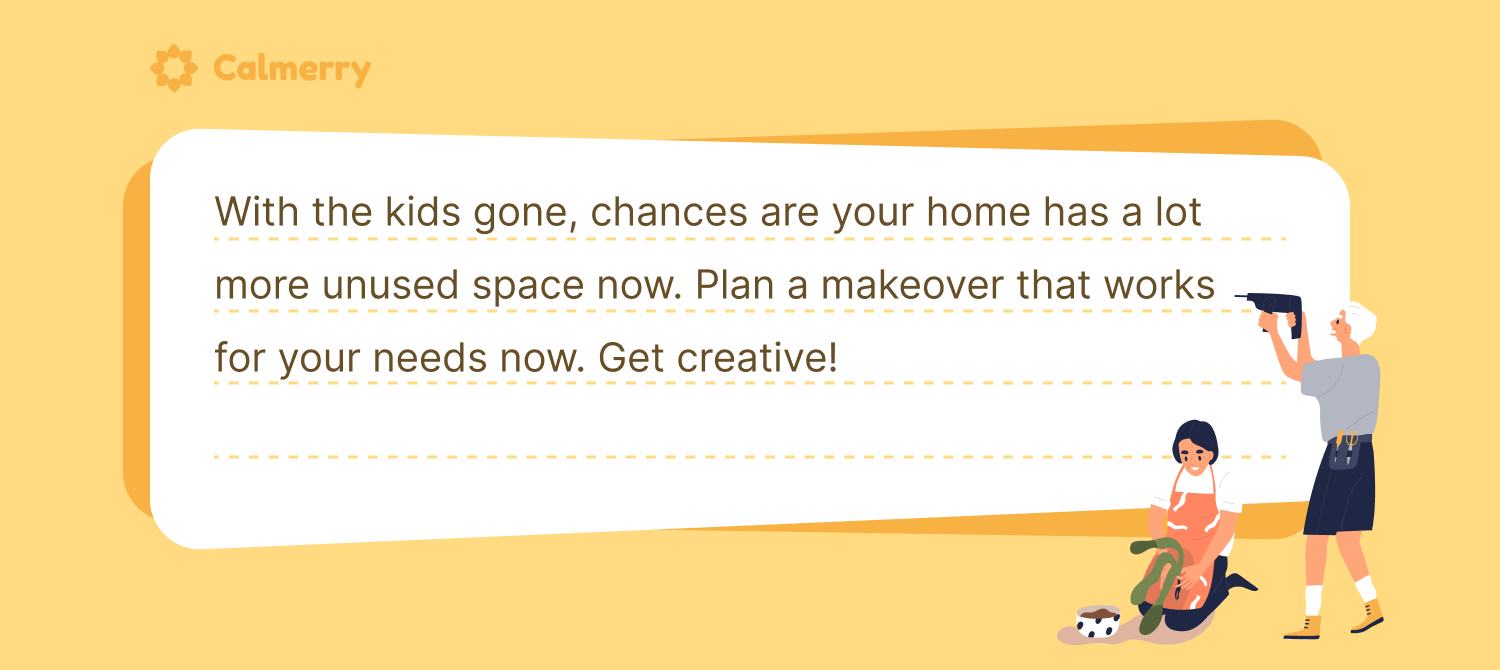Empty Nest Syndrome: The Chicks Have Flown and the Nest Is Empty, Now What?

In this article
It’s hard to remember a time that you weren’t taking care of them. Now, their room is empty, and you find yourself resisting the urge to call or text – again – just to make sure they’re ok.
Are they eating? Who will do their laundry? Did you teach them what they need to know? You’re a parent whose chicks have flown the nest. You’ve become an empty nester.
When you become a parent, you take on the responsibility of raising your child to become a healthy, self-sufficient adult. You know one day, they will leave home, and there is some pride in knowing that you’ve helped them reach that milestone. You might even feel a little twinge of excitement that your time is your own again.
At the same time, you may find that the experience leaves you with big feelings and problems you didn’t expect.
What you’re experiencing is commonly referred to as Empty Nest Syndrome. It’s more than just a pop culture phrase or slang for kids leaving home. It is a real and sometimes difficult phase of parenting. You may find yourself struggling way more than you thought you might.
It can also be a time of tremendous personal growth. There are ways to ease the transition into this season of life and you may emerge with a newfound zest for life and opportunities to fulfill the dreams you thought were left behind.
What is empty nest syndrome?
Sure, kids leaving home can be hard, but what is an empty nester, and what does that mean? Empty nester is a term used to describe parents whose children have left home – the nest – to begin their own journey as adults. But it’s more than just kids leaving home for the first time.
Empty Nest Syndrome is a transitional stage for midlife parents as they help their children take the next step to transition into their own adult lives. It can come with a good bit of psychological stress for parents as they learn to let go.

The feelings and struggles can be quite intense and may include:
- Feelings of grief and loss
- Fear
- Sadness or depression
- Identity crisis/Difficulty adjusting to new their new roles as parents of adult children
- Difficulties in the parents’ relationship that can sometimes result in divorce
Stages of empty nest syndrome
Contrary to how it might sound, Empty Nest Syndrome doesn’t happen overnight or when the last child walks out the door. In fact, you might begin to experience emotions about them leaving well before “the day” comes.
Just how one parent experiences empty nest syndrome will look a little different than another parent, even within the same family. Some parents just find kids leaving home part of the rhythm of life. Other parents struggle with the idea of their children setting off on their own and losing that part of their parenting life.
It’s not unlike the process of grieving, especially knowing that this is the last time you will have this experience.
In Carin Rubenstein’s widely renowned book, Beyond the Mommy Years: How to Live Happily Ever After…After the Kids Leave Home, there are three stages of empty nest syndrome:
- Grief – You may experience sadness, feelings of loss. You might have bouts of tears and feel alone. It’s OK, and it’s part of the letting go process.
- Relief – As the intensity of emotion eases and your time becomes your own again, you may start to feel some relief and even start looking forward to your newfound freedom.
- Joy – As you settle into your new rhythm of life, you may experience joy in being able to pursue new or even rekindled interests.
How long does empty nest syndrome last?
There is no timeline for moving through the process. For some, it may take a few months. For other parents, it can take a year or more. A survey of empty nesters found that the average time to adjust to this new phase of parenting was about three months.
Not everyone will experience every stage. You might stay in one stage longer than another. If you’re experiencing the kids leaving as a couple, how you experience the change may differ from how your partner experiences it. A single parent may experience it in another way.
Who can it affect?
Parents who struggle the most with the empty nest share some common factors:
- Parents who are concerned that their kids aren’t ready to take care of themselves without their help
- Parents who found experiences involving separation from their kids (e.g., weaning from breastfeeding, sending them to camp, starting school) difficult
- Parents whose sense of self is tied to being a parent
- Stay-at-home parents tend to struggle with separating more than those who also worked outside of the home
- Parents who found their own experience of leaving home difficult
- Parents in marriages that are unstable or unsatisfying

Moms seem to be most susceptible. They tend to be the primary caretakers and view motherhood as their primary role. However, this does not minimize dad’s experience. Dads can struggle too.
Cultural parenting practices may also play a role in how a child’s leaving home may be experienced. Parents with an overprotective and highly involved parenting style (sometimes called “helicopter parenting”) may have a really hard time when their kids leave home too.
Moving from sadness to joy doesn’t mean you love your kids any less. It simply means that you have weathered this life stage and are growing into the next. You may even find that you enjoy a new level of connection with your now-adult children.
How to deal with empty nest syndrome
Although it might not feel like it when you’re in the moment, you can get through this time. There are things you can do to move away from the sadness and find joy again.
1. Reconnect with old friends
Chances are, you invested most of your emotional energy on your family. Now may be a great time to reconnect with the friends that you’ve missed spending time with. Those social connections can help combat loneliness and promote emotional well-being. Making dates with friends to do things can motivate you to get out of the house and not dwell on missing the kids.
2. Find new hobbies or creative outlets
Now is a great time to try something new. Maybe you’ve always loved yoga or painting or music. Maybe you’re not sure what’s even out there if it’s been a while. When it comes to hobbies for empty nesters, the possibilities are endless:
- Take a yoga or fitness class
- Learn an instrument you’ve always wanted to learn
- Take a dance class with your partner
- Join a book club
- If you’re into traveling, consider a travel club or a trip with your partner
A great place to start is to check out local community offerings. Finding something you love to do brings a sense of well-being and also brings you into contact with others. That social connection can be a great source of support and motivation. And you might just have some fun along the way!

3. Practice good self-care
As you’re adjusting to your new normal, make time to take care of yourself. Get that mani/pedi. Make time for a leisurely walk or bubble bath. Schedule a massage. Taking care of yourself is a gift you give yourself. Find the self-care rituals that make you feel your best and incorporate them into your routine.
4. Focus on the positives in your life
While you may be feeling the loss, it’s also important to look at the positives. You have successfully helped your child step out into the world as an independent adult. That is no small feat and deserves to be celebrated. You now have the opportunity to reconnect with them in a whole new way.
5. It’s OK to stay in touch with them
Whether they’re across town or across the country, make it a point to stay in touch. You will be able to know they’re ok, and they’ll know you love them.
6. Re-imagine your space
With the kids gone, chances are your home has a lot more unused space now. You don’t have to keep their room “as it was.” You don’t even have to stay where you are. House plans for empty nesters run the gamut from a room makeover to a whole new space.
A recent survey found that 71% of empty nesters renovate their homes. Plan a makeover that works for your needs now. Get creative!
You may decide to downsize. A lot of people find their house just too big. There are homes designed with empty nesters in mind! Find the location and home that is right for you now.

7. Reconnect with your partner
If you’re like most couples, you went from “the two of us” to “a family,” and the focus shifted to raising kids. The “couple” part of the relationship took a back seat. Now it’s just the two of you again.
It’s true, some couples struggle during this time, and even divorce once the kids are gone. But it’s not as grim as you might think. A lot of couples report an increase in marital satisfaction following the kids leaving home. One survey found that 63% of couples reported feeling closer to their partner, and 58% reported being more intimate with their spouse.
This time is a great opportunity to redefine and rekindle your relationship. Spend some time together. Set some goals together. It’s a time for new beginnings.
If you’re struggling
There is no “right” or “wrong” way to deal with kids leaving home. It’s bittersweet and can flip your world upside down in ways you didn’t see coming.
If you find that you’re struggling with the empty nest, it’s ok to seek help. A therapist can help you sort through your feelings and find ways to cope with this transition. If you and your partner are struggling, you may even choose to seek some couples counseling to help you as you find “the two of us” again.
Finding help is easier than ever with the rise in online therapy options. Online therapy allows you to access care when and how it makes sense for you. And online therapy has been shown to be as effective as traditional in-person counseling. Whether you’re dealing with anxiety, depression, or any other mental health concern, Calmerry offers a viable and effective solution. When you feel ready, there is help, and there is healing.
online therapy
live video session


